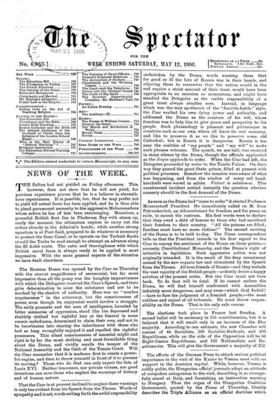The Russian Duma was opened by the Czar on Thursday
with the utmost magnificence of ceremonial, but far more impressive than all the pomp was the haughty impassiveness with which the Delegates received the Czar's Speech, and their grim determination to seize the substance and not to be mocked by the shadow of authority. Here was no "sombre acquiescence" in the autocracy, but the consciousness of power, even though its enjoyment would involve a struggle. The surly peasants and the men of intelligence, haunted by bitter memories of oppression, stood like the depressed and shabbily clothed but rightful heir at the funeral in some cosmic melodrama, determined to claim their own, and not to be browbeaten into sharing the inheritance with those who had so long wrongfully enjoyed it and repelled the rightful possessors. This silent consciousness of essential might and right is by far the most striking and most formidable thing about the Duma, and vividly recalls the temper of the National Assembly and the Oath of the Tennis Court. Will the Czar remember that it is madness first to create a power- ful engine, and then to throw yourself in front of it to prevent its moving P Those who do that can only expect the fate of Louis XVI. Neither innocence, nor private virtues, nor good intentions can save those who neglect the warnings of history and of human nature.










































